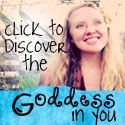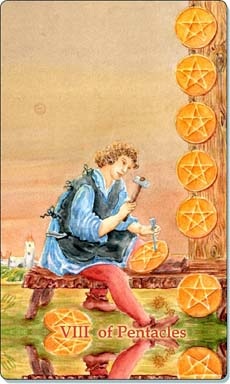 A lot of people look at Tarot as a way to go deeper into their own lives. That's what I do: helping people shed light on the patterns and energies in their lives, giving them a better look at where to go next. But what I love about the cards is they can be so versatile. Sometimes even a day-to-day question can get you strikingly specific results.
The time I couldn't get in touch with a friend, for instance, so I consulted the cards and drew The Moon (needless worry) and the Four of Wands (a celebration). She was at a festival that day, and couldn't get to her phone. Or this weekend, when my computer was being an absolute delight, and I hadn't heard from my tech support forum of choice for hours. The Magician told me I had the tools I needed to tackle it myself, and while I didn't fix everything, I did manage to get my Internet back online.
Of course, it's probably not always going to be effective if you rely on a deck of cards to tell you what to have for dinner tonight. But it makes for an interesting way to flex your reading muscles. Part of being an effective reader, after all, is letting your intuition stretch you just beyond the classic meanings of the cards into a new mode of thinking. (How would you use the cards to decide what's for dinner? Six of Cups means a favorite childhood meal? The Tower means something spicy with bold flavors?)
It's not good to let Tarot do all your thinking for you, of course, and it's an easy trap to start relying on it too much. Ultimately everything should rely on your own decisions and common sense. But give the Tarot a spin for an unusual question sometime, and see what muscles it flexes in your mind. It just might surprise you.
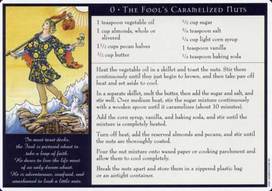 One of the many awesome things about Tarot is just how diverse it is. Even when a lot of what's out there is copying the familiar images of the Rider-Waite Tarot, its variations are like giving a new spin to a familiar friend. And when Tarot does step out of that box? There's a whole list of things you can discover. Here's a few on my wishlist. - Astrology. The Golden Dawn and other esoteric organizations found that with a tiny bit of wiggling, Tarot corresponds to astrology and makes a pretty excellent teaching tool. The Celestial Tarot talks about those direct associations, and has some really gorgeous art to help you learn a little about Tarot and the stars.
- Crystals and Herbs. Magickal types love associations, so I'm going to give you a two-for-one here. The Crystal Tarot links Tarot to gemstone therapy, and if you want to learn herbcraft, there's a Tarot for that too.
- Fairy Tales and Myths. Modern Tarot interpretations are all about archetypes, and there are some universal archetypes - and some that change based on the time and nation of the telling. Fairy tales? Here, have two decks with tales from all over the world. Religion and mythology? (To be inclusive, let's say one man's myth is another man's gospel.) Arthurian, Celtic, Christian, Greek, Egyptian, Norse, even a well-researched deck about several Native American tribes, the Tarot runs the gamut.
- Recipes. There are two different decks that create recipes based on the cards, one with just the Major Arcana and one with 78 different recipes for an entire deck. And as a bonus? A deck that tells the entire history of chocolate. I'm pretty sure that's something I never knew I always wanted.
- Science. I'm pretty useless when it comes to science and math, but the Quantum Tarot somehow combines Tarot with quantum physics, and that is pretty damn awesome.
Did I leave out any of your favorites? Anything on the same subject with better research? Leave me a comment, I'd love to hear from you!
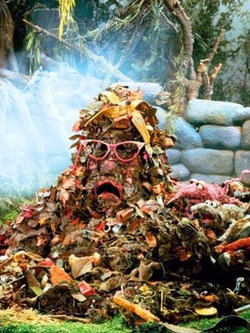 I've been rewatching a lot of Fraggle Rock lately, since my girlfriend with a decidedly HBO-deprived childhood has never seen it. Yeah, yeah, I'm a grown-up and I'm supposed to be above these things. But screw my credibility. There's a lot of simple wisdom in kids' stuff that we don't really remember to touch as adults, and it's Jim Henson, creator of the Muppets and Sesame Street, which should say it all.
And Fraggle Rock? Has to be the most pagan show I've ever seen. A living, breathing system of caves that teach about the interconnectedness of life? A festival where you compose tributes to the full moon? And if you want to teach a newly-minted teenaged Wiccan about why she can't be initiated just yet, just show her "Mokey and the Minstrels".
Then there's Marjory the Trash Heap, the "all-knowing" oracle who pings me quite a bit for obvious reasons. She demonstrates some genuine power and insight towards the end of the series, but mainly Marjory is kind of a shyster - someone who gives you not-quite-groundbreaking sayings or junk objects in the form of talismans. She does claim to be all-knowing, but the Trash Heap doesn't really take payment for her services. She's more than happy to dispense a little bit of cryptic practicality, watch the Fraggles mistake it for deep wisdom, and then let them work out their own problems with this new bit of direction. Her ultimate goal is the goal of all great oracles: to no longer be needed.
And often, the magic works. Anxious Boober feels a surge of courage when clutching a bottlecap inscribed with the words "no deposit, no return." Red and Wembley learn the charm of spilling a bottle of milk and pointedly not crying over it, which gives them the confidence to finally stop worrying and make a plan.
What Fraggle Rock knows, and what Tarot readers know, is that objects and sayings aren't the important thing. There are literal "junk oracles", where you draw discarded odds and ends out of a bag and make observations based on what you find/the meanings you attach. And they're much the same as Tarot's lovely, inspiring, and extremely subjective art. The power is in the reader, whether that's intuition or just plain common sense. It connects us to the magic of the world, taps us into something bigger.
The insights from divination are personal insights, a little nudge in the right direction. They encourage someone to understand the situation and get moving, with the confidence that they knew a little more about themselves and their path than they did half an hour ago. There's a tremendous, often magical power in that. And the greatest power of all, of course, is that you can put a little of your focus and intention into the world - and get a great deal back out of it, no matter what tools you use.
"No deposit, no return."
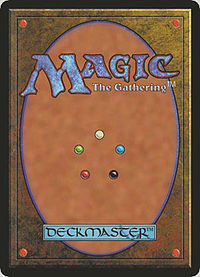 You know how some people get brilliant flashes of inspiration in the shower? My completely un-brilliant flash went like this:
By all evidence, history shows us that Tarot originated in the mid-15th century as a card game called tarocchi. Each card in the Major Arcana represented a different rule that applied to the actual game. There's a lot of discussion about whether the Tarot also hid certain pagan ideas (unlikely, since earlier decks were very medieval Christian), or was used in teaching religious allegory to kids. But as far as history suggests, Tarot became used for divination because a lot of things are used for divination: tea leaves, entrails, playing cards (a method that pre-dates Tarot cards as a game or an oracle, I believe).
Now, this doesn't overturn Tarot's legitimacy one bit. First of all, Tarot spoke to people as a teaching tool and an oracle because it works with archetypes, very universal figures and ideas. The images were inspiring, and really that's all divination takes: taking a look at something as a lens through which you view your life and your future. You can divine using toothpicks, coins, or clouds, so long as you have a consistent meaning attached to them. The magic is in you and in the Universe. Tarot is just a very creatively inspiring tool, one that happened to link up very easily to a lot of pre-existing ideas, and became a very effective method for teaching them.
So effective, in fact, that Tarot's popularity as an oracle grew in the 1800s, when a man named Antoine Court de Gebelin was convinced that Tarot originated in Egypt and represented Egyptian mysteries. He wrote a paper alleging a lot of connections, and others picked up on it. (Scholarship was like that a lot, back then, and Egypt fever was alive and well.) And the idea that Tarot came from Egypt, and even Atlantis, survives to today.
Now, my grand revelation? Tarot started out as a card game with a series of characters that can alter the rules of what each player is allowed to do. And amazingly, we have card games like this all the time today, mainly in the form of trading cards. Pokemon has a card game similar to this, and an American version is Magic: The Gathering. And my absolute favorite weird bit of synchronicity? A card game from Japan called Yu-Gi-Oh, where the game's fictional mythos is that it was originally played in Egypt, commanding real magickal forces, and slowly evolved into a children's game years into the future.
In some ways, Tarot is a reverse-engineered Yu-Gi-Oh - a game my now-adult brother played a lot as a kid. When I informed him of this connection, he burst out laughing. And then, after a pause, he added: "History is weird."
I had to agree.
|




 RSS Feed
RSS Feed
